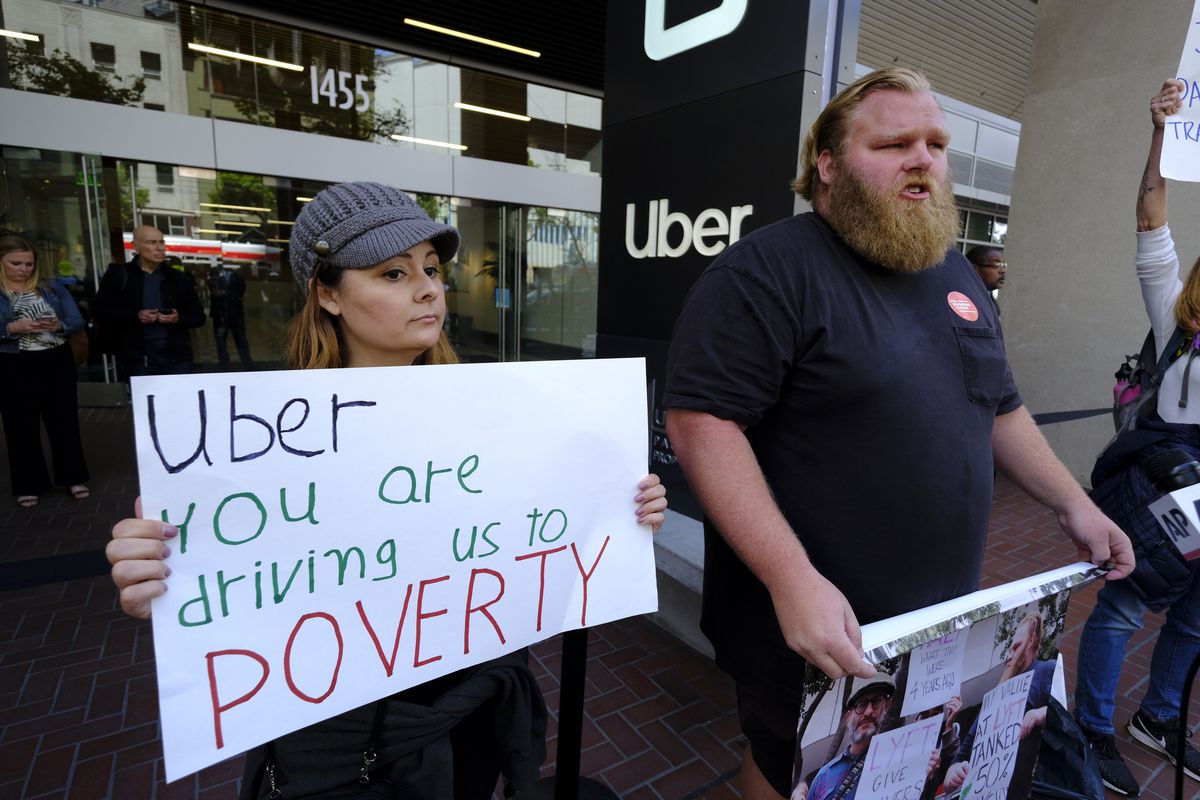Uber drivers around the world took the streets on Wednesday to protest their wages. From Sydney to London to New York to San Francisco, drivers say they’re working increasingly long hours for increasingly less pay and it’s becoming impossible to earn a living. Along with protests, drivers in several cities are shutting down their apps for 12 hours as a form of strike against the ride-hailing company.
The strike and protests come two days before Uber is expected to debut on the stock market with an initial public offering that is expected to raise around $9 billion and would value Uber at about $91.5 billion. That means hundreds of Uber employees will likely become overnight millionaires and the disparity of wealth between company employees and drivers will get even wider.
“When I started it was part time, but now everyone is full time just to pay our bills,” said San Francisco driver Mostafa Makled and one of the organizers of the Bay Area protest. “Every year they change their policies regarding their rates.”
Uber has changed drivers rates over the past couple of years, according to Harry Campbell, a Los Angeles driver who runs a popular blog called The Rideshare Guy. The company often makes these changes without a lot of warning or explanation to drivers.
This isn’t the first time drivers have protested against Uber. Over the years, they’ve become increasingly unhappy with steadily lower pay, longer working hours and little to no support. They’ve staged protests, filed lawsuits, quit driving for the company or switched to rival Lyft.
For its part, Uber has rolled out new initiatives in an effort to make things better for drivers, such as in-app tipping, a feature that pays drivers extra if they have to wait for customers and 24/7 phone support. Uber’s very existence depends on retaining drivers, because without them, it doesn’t have customers.
Still, drivers say these initiatives aren’t enough.
San Francisco Protest
About 100 drivers gathered in San Francisco in front of the company’s downtown headquarters. The atmosphere was more festive than tense as a brass band played and protestors chanted, “What do we want? Far pay. When do we want it? Now.”
Some people toted signs saying “Uber CEO: $43 million/year, Uber driver: $9/hour” and “Uber you are driving us to poverty.”
One of the protestors was Shannon Liss-Riordan, the lawyer who’s brought several cases against Uber on behalf of drivers. These lawsuits center around Uber’s classification of drivers as independent contractors, rather than employees. Drivers must pay their own health insurance and don’t get benefits like sick days or vacation leave; they also have to pay for their own car maintenance, gas and other associated driving costs.
Liss-Riordan has said that a lot of Uber’s success is built on the backs of the drivers and that the company shifts many of its costs of running a business onto workers since they aren’t classified as employees. She said she was happy to see the drivers come together for the protest on Wednesday.
“It’s when people come together that they make a difference,” Liss-Riordan said.
Gary Branson has been an Uber driver in the Bay Area about two years. He said he’s given about 5,000 rides with Uber, but he still can barely earn a living.
“I live an extremely minimalist lifestyle and see what I can do to move past this situation,” Branson said. “Uber could charge more for their rides and pay their drivers enough to pay their rent.”
Makled and the group he organizes with, called Gig Workers Rising, said he’s reached out to Uber headquarters a number of times about driver conditions but hasn’t heard back. So he’s taken his battle to California’s capitol and has met with Gov. Gavin Newsom and a handful of senators. He hopes to get laws passed that will better protect drivers.
“[Uber is] pressuring everyone to drive 70 to 80 hours a week,” Makled said. “And that needs to stop.”






